
PUMPA - SMART LEARNING
எங்கள் ஆசிரியர்களுடன் 1-ஆன்-1 ஆலோசனை நேரத்தைப் பெறுங்கள். டாப்பர் ஆவதற்கு நாங்கள் பயிற்சி அளிப்போம்
Book Free DemoThe lesson "The Summit Within" is an inspiring true story of India's most iconic mountaineer named Major H P S Ahluwalia. He was a member of India's first successful expedition to Mount Everest in \(1965\).

Mount Everest
The lesson "The Summit Within" opens with the narrator expressing how he felt as he stood at the summit of Everest. While gazing down into a vast region, he felt numerous emotions rushing through him. He believed that among all the emotions, humility was the dominant one. The fact that he had reached the summit of Everest and it did not fill him with joy. In addition, the sentence implies that while standing in front of nature, the narrator felt humble or lacked pride. His physical, on the other hand, seemed to say, "Thank God, it's all over!" It implies that the narrator wanted to thank God for assisting him in reaching his destination as well as he felt merely glad because everything got over.
However, instead of being happy, the narrator felt a shade or trace of sadness in his mind. He had climbed Mount Everest by facing various climatic changes. He would have felt happy for achieving his goal. But on the contrary, he felt a tinge of sadness in his mind. The narrator questioned himself about the cause of his distress. He believed that the only reason he was sad was that he had done the ultimate in climbing. The statement implies that the narrator had reached the world's highest peak and that there was nothing further to climb after that. Also, he stated that all roads hereafter would lead down. It implies the narrator had climbed over the highest mountain. Therefore, if he wished to climb the other mountains, it would be comparatively smaller than Mount Everest, and all roads would lead him down.
In short, the narrator wanted the readers to know that after reaching Mount Everest, he believed that there would be no other mountains like it and mounting any other peak would lead him down.
According to the narrator, climbing to the summit of Everest filled people with a great sense of excitement and gratitude. It was a kind of thrill that lasts forever. He further stated that the experience gained from climbing the mountain would completely transform the people.
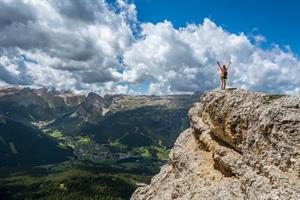
Climbing to the summit fills a man with a deep sense of joy and thankfulness
A man who had climbed the mountains would not be the same again. The reason behind the statement is that if one attempted to climb Everest or any other mountains, they would reach their target after encountering numerous challenges. The difficulties or struggles they encountered along the way taught them a valuable lesson or motivated them to succeed in life. After finishing mountain climbing, they would face their lives with challenges. In addition, the narrator remarked that while climbing the mountains, one became aware of his insignificance and loneliness in this vast universe.
When he reflected on his life after climbing Mount Everest, he couldn't stop thinking of another big summit. Here another big summit implies one's mind, which wouldn't be much easier to climb. No one can give a complete answer to what one guesses or what one forecasts when it comes to our mind. The mind's thought goes beyond our imagination. The narrator mentioned that, like climbing Everest, it was not easier to climb on one's mind or thoughts. Climbing the summit within was more challenging as well as it was not easier to climb.
After returning from Everest and recovering from the physical tiredness, the narrator began to question himself why he had climbed the world's highest peak. It wasn't easy to understand why the achievement had such a long-lasting impact on his thoughts; it was a thing of the past that feels like it had done yesterday. With each passing day, he was well aware that the experience would get old. He wasn't sure if the memory would last or if it would go away gradually at the time.

The narrator questioned himself as why he had climbed Mount Everest
While contemplating the difficulties or problems encountered while climbing mountains, the narrator’s mind led him to question why people climb mountains. It wasn’t easy to come up with answers to such questions. He also mentioned the most basic responses given by other climbers: “Because it is there.” The statement implies that climbing a mountain presented great difficulties, and the climbers took delight in overcoming obstacles.
Then the narrator stated that climbing the mountain involved numerous challenges, and we all knew how satisfying it would be for the climbers to conquer them all. He also mentioned that climbing the mountain offered physical hurdles. It implies that while climbing mountains the climbers would encounter bodily harm. Whenever these difficulties occur, they would face them with tolerance, willpower, and firm decision because the climbers’ main intention was to reach the destination. As a result, they would manage and overcome all obstacles till they reach the summit.
Then the narrator stated that climbing the mountain involved numerous challenges, and we all knew how satisfying it would be for the climbers to conquer them all. He also mentioned that climbing the mountain offered physical hurdles. It implies that while climbing mountains the climbers would encounter bodily harm. Whenever these difficulties occur, they would face them with tolerance, willpower, and firm decision because the climbers’ main intention was to reach the destination. As a result, they would manage and overcome all obstacles till they reach the summit.
According to the narrator, the three essential physical qualities a climber need to have while climbing was strength to face the problems, the firm decision not to give up in between and the continuous effort. He agreed that all these three qualities would make the climb more thrilling. The exhibition of these physical qualities and one’s awareness towards them, on the other hand, was exciting, and the same was the case for the narrator.
In contrast to the responses of others, the narrator indicated that he had a more personal answer for the question of why he had climbed the mountains. The narrator shared his interest in rock climbing with his readers. He said he had a deep love for mountains since he was a child. He used to feel lonely and melancholy in the plains when he was away from the mountains.
In contrast to the responses of others, the narrator indicated that he had a more personal answer for the question of why he had climbed the mountains. The narrator shared his interest in rock climbing with his readers. He said he had a deep love for mountains since he was a child. He used to feel lonely and melancholy in the plains when he was away from the mountains.
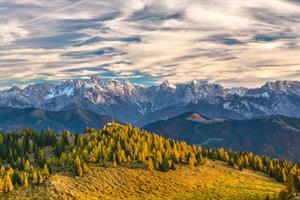
The narrator believed that mountains are the best embodiment of nature's beauty
Later the narrator went on to say that even after answering why people climb mountains, the question of "Why Everest?" remained unanswered. It indicated that there were many mountains suitable for climbing, and his mind questioned why he had selected Everest in particular.
The narrator had his reason behind climbing the world's highest mountain. He said that Everest was the world's highest peak and the most powerful mountain. Many people had tried and failed to climb over it because it was the most difficult climb. As a result, he was tremendously interested in climbing Everest. People needed every bit of power to reach the summit of Everest. It indicates while climbing Everest, the climbers undergo numerous hurdles. Also the narrator stated while climbing Everest, the climb would take one's energy completely.
While climbing up, the climatic conditions vary, and it was a tough battle to fight against ice and massive rocks. When people were fighting with ice and huge rocks while ascending Everest, they cannot stop or give up even if their lives were in danger. It meant that the climbers would have to constantly deal with the hard ice and heavy rocks, and they would face it with determination and strength.
The narrator had his reason behind climbing the world's highest mountain. He said that Everest was the world's highest peak and the most powerful mountain. Many people had tried and failed to climb over it because it was the most difficult climb. As a result, he was tremendously interested in climbing Everest. People needed every bit of power to reach the summit of Everest. It indicates while climbing Everest, the climbers undergo numerous hurdles. Also the narrator stated while climbing Everest, the climb would take one's energy completely.
While climbing up, the climatic conditions vary, and it was a tough battle to fight against ice and massive rocks. When people were fighting with ice and huge rocks while ascending Everest, they cannot stop or give up even if their lives were in danger. It meant that the climbers would have to constantly deal with the hard ice and heavy rocks, and they would face it with determination and strength.
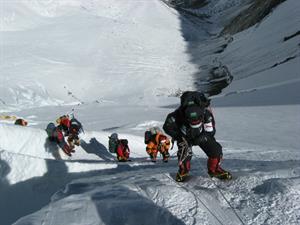
People climbing Mount Everest and fighting against ice
Once someone had begun the difficult task of climbing Mount Everest, there was no way for them to give up in between because the journey backwards presented the same obstacles and challenges as the journey upwards. It meant that climbing Everest would be like a fight between barriers. It would give them a lot of struggles, and it was not easier to judge how the climbers would feel while climbing Everest. On the other hand, after mastering these hurdles, one felt immense happiness, excitement, joy, and victory over their accomplishment. It gave them a sense of satisfaction as if they had fought and won a battle.
The narrator claimed that while standing on Everest, he caught the glimpse of a distant peak. While looking at the peak, he got transported to another universe. He had gone through a transformation that could only be described as mystical. It meant that the beauty of the peak seemed to be magical and spiritual. Also, the narrator stated that there were many qualities in the peak, such as its uniqueness and power. The summit drawn him to it as Everest did because of its beauty, aloofness, might, toughness, and the obstacles endured along the way. The narrator believed that it was a difficult hurdle to overcome.

The narrator saw a distant peak
Later, the narrator stated that after reflecting on his response to why he climbed Everest, he realised that he hadn't adequately expressed why he did so. In addition, he believed there would be no answer to such difficult questions. For instance, he responded that asking why he climbed the mountain was similar to asking why people breathe, help their neighbours, or do good things. It was impossible to find answers to these questions. It meant that he had no answer for why he climbed Mount Everest.
The narrator also mentioned that climbing Everest was not a physically demanding task. A person who had reached the peak of a mountain had been more aware of how little their existence was in comparison to the vastness of the universe. He also believed that spiritual changes occur in parallel with physical changes.
The narrator also mentioned that climbing Everest was not a physically demanding task. A person who had reached the peak of a mountain had been more aware of how little their existence was in comparison to the vastness of the universe. He also believed that spiritual changes occur in parallel with physical changes.

A man on mountain top realises his smallness in the large universe
The narrator also stated that overcoming physical barriers was only one bit of achievement. There was a lot more to it, as the sense of accomplishment, the satisfying urge to rise above the current circumstances. It was the never-ending desire for adventure in a person. So, the experience was not just physical, but emotional and spiritual too. The narrator expressed how one felt when one attained their destination. Arriving at his destination would provide him with a sense of accomplishment, fulfilment, and the strength to overcome his challenges. In other words, the narrator was implying that mental satisfaction was also required while climbing Everest in addition to physical pleasure.
Later the narrator urged his audience to consider a typical climb towards the summit on the last heights. At first, a person shares a rope with another climber while ascending Everest. Then the second step is to put a firm foot. 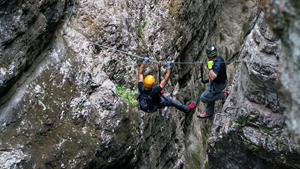
A man sharing rope with another climber 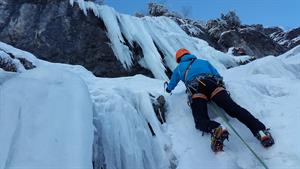
The narrator stated that the climb is very hard, and sometimes people required help from their fellow members. He further added that the assistance became so vital that the climber would have given up climbing in between if the climber had not received it. He described how many well-known climbers have acknowledged relying on others for help, claiming that it was the only way they could help them progress at the time. If they hadn't received assistance from a close one, they would have given up. He also added that the fellow climbers' timely assistance boosted the climbers' confidence. 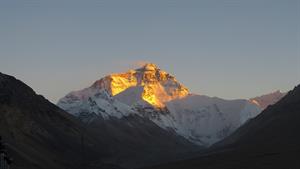
Sunlight falls on a peak
When the narrator and his companions reached the summit of Mount Everest, they thought of leaving something as a sign of reverence. At first, the narrator placed a portrait of Guru Nanak Dev on Everest. His fellow climber named Rawat left the picture of Goddess Durga. Phu Dorji placed a relic of Buddha, and Edmund Hilary erected a cross in the snow beneath a stack of pebbles. The narrator then clarified that these were the symbols of admiration and respect rather than achievements. This is because reaching the summit transformed them completely. 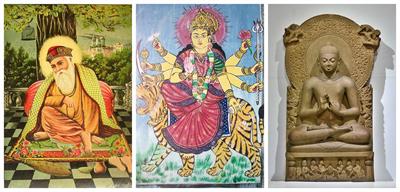
Goddess Durga*: Sujit kumar, CC BY-SA 4.0, via Wikimedia Commons Statue of Buddha**: Tevaprapas, CC BY-SA 3.0, via Wikimedia Commons

A man sharing rope with another climber
The companion then carves steps in the hard ice and assists the man in moving up the mountain inch by inch. According to the narrator, the climb would be depressing or challenging. The climber makes him feel like every nerve would be under a lot of pressure as he climbed each step. He also mentioned that the climber would feel the strain throughout his entire body.

The companion cuts the steps in the hard ice
The narrator stated that the climb is very hard, and sometimes people required help from their fellow members. He further added that the assistance became so vital that the climber would have given up climbing in between if the climber had not received it. He described how many well-known climbers have acknowledged relying on others for help, claiming that it was the only way they could help them progress at the time. If they hadn't received assistance from a close one, they would have given up. He also added that the fellow climbers' timely assistance boosted the climbers' confidence.
Breathing is difficult at such high altitudes and in such cold temperatures. The narrator mentioned that once the man starts climbing Everest, he would realise how difficult it was. In such a case, the climber may curse himself for choosing the task, or else he may doubt whether he could reach the designation.
While the body starts to feel the pressure, the climber would wonder or start questioning himself as to why he had chosen the climb. As a result, the climber would think that after experiencing stress or agony, his mind would occasionally instruct him to stop doing everything in between. It forces them to give up, and the prospect of going back would seem reassuring. But something inside him does not make him quit his journey; he ignores every pressure or pain and keeps moving forward the journey. Also, the companion would always be near him. He would help in motivating him to continue his climbing. Then he would keep on saying that there was just another fifty feet or hundred to reach the summit. In this way, they kept on moving the climb.
While climbing up, one keeps on asking himself when would the journey end. Both of the companions would look at each other and motivate them as there were only a few steps to go. As a result, each person draws inspiration from the other and continue to work towards their objective. Finally, without even realising it, they would have reached the summit. Also, the narrator added that they thought of quitting or giving up several times, but the motivations drive them to reach the summit of Everest.
While climbing up, one keeps on asking himself when would the journey end. Both of the companions would look at each other and motivate them as there were only a few steps to go. As a result, each person draws inspiration from the other and continue to work towards their objective. Finally, without even realising it, they would have reached the summit. Also, the narrator added that they thought of quitting or giving up several times, but the motivations drive them to reach the summit of Everest.
Later the narrator mentioned that once the person reached the summit, he would look around and tell himself that the pressure, hardships, battle and everything he underwent was worthwhile. Then the narrator stated that the surrounding peaks could be seen through the clouds, and if one were lucky, there might be sunlight on them. The neighbouring peaks form a "jewelled necklace" around the summit's neck. It implies that when the sunlight falls on the small peaks, it appeared to be like wearing a jewelled necklace. The climber could see the enormous valleys from a distance as it slopes down. Also, he stated that looking down from a mountain's peak was a noble and enlightening experience. At last, the climber would bow down his head and pay his respect to whichever God he worships when looking out over the immense grandeur of nature from the summit.

Sunlight falls on a peak
When the narrator and his companions reached the summit of Mount Everest, they thought of leaving something as a sign of reverence. At first, the narrator placed a portrait of Guru Nanak Dev on Everest. His fellow climber named Rawat left the picture of Goddess Durga. Phu Dorji placed a relic of Buddha, and Edmund Hilary erected a cross in the snow beneath a stack of pebbles. The narrator then clarified that these were the symbols of admiration and respect rather than achievements. This is because reaching the summit transformed them completely.

Portraits of Guru Nanak, Goddess Durga and statue of Buddha were left in Mount Everest as a sign of reverence
Then the narrator stated that the climb to Mount Everest changed him completely. It made him a different person. Apart from the physical summit, the narrator said that there was another summit, the summit within one's mind. He described how each person's mind had a mountain peak that must be climbed to achieve perfect awareness of oneself.
Later the narrator stated that the summit within was terrifying and unquantifiable. Furthermore, one had to climb on their summit. He explained how physically ascending a mountain was equivalent to climbing a mountain inside one's mind. The effects of both climbs are the same as well. Regardless of whether the ascent was physical, emotional, or spiritual, it utterly transformed everyone. It would teach a lot about oneself and the world around him.
The narrator thought that his time as an "Everester" had given him the strength and inspiration to face life's adversities with courage and determination. Climbing Everest was an unforgettable experience, and achieving the top within was no less so. Also, he stated that internal summits were higher than Everest's physical top.
Through this lesson, the narrator tried to tell his readers that, like mountain climbing, life has many hurdles. In everyone's life, there was a mountain peak. People should work hard to overcome the obstacles in their life. For that, the most important thing was one should realise their smallness in the vast universe. The narrator's wish was that everyone must climb the summit within oneself.
Later the narrator stated that the summit within was terrifying and unquantifiable. Furthermore, one had to climb on their summit. He explained how physically ascending a mountain was equivalent to climbing a mountain inside one's mind. The effects of both climbs are the same as well. Regardless of whether the ascent was physical, emotional, or spiritual, it utterly transformed everyone. It would teach a lot about oneself and the world around him.
The narrator thought that his time as an "Everester" had given him the strength and inspiration to face life's adversities with courage and determination. Climbing Everest was an unforgettable experience, and achieving the top within was no less so. Also, he stated that internal summits were higher than Everest's physical top.
Through this lesson, the narrator tried to tell his readers that, like mountain climbing, life has many hurdles. In everyone's life, there was a mountain peak. People should work hard to overcome the obstacles in their life. For that, the most important thing was one should realise their smallness in the vast universe. The narrator's wish was that everyone must climb the summit within oneself.
Reference: